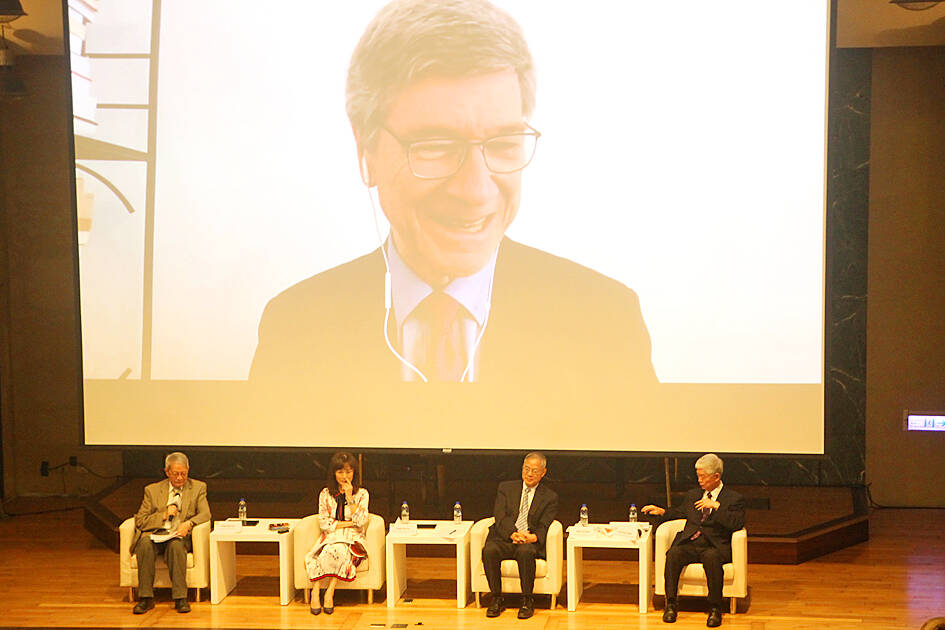Economist Jeffrey Sachs on Monday urged Taiwan and China to commit to dialogue to find a peaceful resolution amid rising cross-strait tensions.
“We need dialogue urgently, because if it’s only taking the worst of the other side and that is what’s happening right now, we will get into an escalation cycle ... we are in an escalation cycle that’s very dangerous,” Sachs said via videoconference.
He was speaking at a Tang Prize Forum at National Cheng Kung University in Tainan. Sachs has won this year’s Tang Prize for Sustainable Development.

Photo: CNA
Taiwanese academics asked Sachs about the relationship between Taiwan, China and the US, particularly following US House of Representatives Speaker Nancy Pelosi’s visit to Taipei last month. Beijing launched live-fire drills in the waters around Taiwan immediately after Pelosi’s departure.
Sachs said he believes dialogue is the best option, as it would allow all parties to understand each other’s respective position, interests and security needs.
“I hope I’m not naive in believing that there is an absolutely peaceful and mutually constructive approach, that is my strong view. And it’s not only my hope, it’s also my understanding, but we’re not naturally gravitating towards that right now because there is very little trust and very little discussion,” he said.
It is important for all sides to aim at cooperation instead of taking provocative or dangerous actions, because the economic cost of the loss of trust are extremely high, Sachs said, citing the benefits of having an integrated power grid in Northeast Asia.
“There’s no reason that Taiwan cannot power itself with Gobi Desert renewable energy, because there could be a regional grid,” he said. “But this requires trust, this requires a sense of security and national security, and that trust doesn’t exist right now.”
Referring to the distance of about 250km from Xiamen, China, to Taichung, he said: “That’s a pretty routine submarine cable, so one could, if there were a high level of trust, connect the mainland and Taiwan power grid, and make all sorts of solutions that don’t exist right now.”
Sachs is recognized for his bold and effective strategies to address complex challenges, such as extreme poverty, climate change, international debt and financial crises, national economic reforms, and the control of pandemics and epidemics.
To address issues related to sustainable development, Sachs combined the fields of economics, public health, equity and sustainability to pioneer a multidisciplinary approach, transforming sustainable development into an integrated field of study and practice, the Tang Prize Foundation has said.

Taiwan has received more than US$70 million in royalties as of the end of last year from developing the F-16V jet as countries worldwide purchase or upgrade to this popular model, government and military officials said on Saturday. Taiwan funded the development of the F-16V jet and ended up the sole investor as other countries withdrew from the program. Now the F-16V is increasingly popular and countries must pay Taiwan a percentage in royalties when they purchase new F-16V aircraft or upgrade older F-16 models. The next five years are expected to be the peak for these royalties, with Taiwan potentially earning

STAY IN YOUR LANE: As the US and Israel attack Iran, the ministry has warned China not to overstep by including Taiwanese citizens in its evacuation orders The Ministry of Foreign Affairs (MOFA) yesterday rebuked a statement by China’s embassy in Israel that it would evacuate Taiwanese holders of Chinese travel documents from Israel amid the latter’s escalating conflict with Iran. Tensions have risen across the Middle East in the wake of US and Israeli airstrikes on Iran beginning Saturday. China subsequently issued an evacuation notice for its citizens. In a news release, the Chinese embassy in Israel said holders of “Taiwan compatriot permits (台胞證)” issued to Taiwanese nationals by Chinese authorities for travel to China — could register for evacuation to Egypt. In Taipei, the ministry yesterday said Taiwan

Taiwan is awaiting official notification from the US regarding the status of the Agreement on Reciprocal Trade (ART) after the US Supreme Court ruled US President Donald Trump's global tariffs unconstitutional. Speaking to reporters before a legislative hearing today, Premier Cho Jung-tai (卓榮泰) said that Taiwan's negotiation team remains focused on ensuring that the bilateral trade deal remains intact despite the legal challenge to Trump's tariff policy. "The US has pledged to notify its trade partners once the subsequent administrative and legal processes are finalized, and that certainly includes Taiwan," Cho said when asked about opposition parties’ doubts that the ART was

If China chose to invade Taiwan tomorrow, it would only have to sever three undersea fiber-optic cable clusters to cause a data blackout, Jason Hsu (許毓仁), a senior fellow at the Hudson Institute and former Chinese Nationalist Party (KMT) legislator, told a US security panel yesterday. In a Taiwan contingency, cable disruption would be one of the earliest preinvasion actions and the signal that escalation had begun, he said, adding that Taiwan’s current cable repair capabilities are insufficient. The US-China Economic and Security Review Commission (USCC) yesterday held a hearing on US-China Competition Under the Sea, with Hsu speaking on